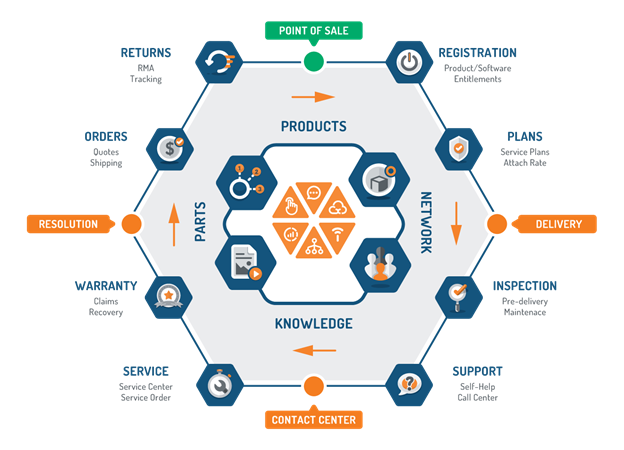
Aligning People, Processes, and Technology to Improve Post-Sale Durable Goods Customer Experiences and Revenue
Aftermarket has taken a backseat to other company-wide digitization initiatives for durable goods manufacturers for far too long. While we collectively recognize the value of post-sale revenue, it has been difficult—and nearly impossible—to align the people, processes, and technology required to optimize the approach.
Razor-thin margins on the products we sell are driving a sea of change among executives in the industry who now recognize that their ability to deliver post-sale services will make or break their businesses. Fortunately, the emergence of Service Lifecycle Management (SLM) is making it easier for these durable goods manufacturers to provide a seamless experience across every customer touchpoint in the service lifecycle.
What is Service Lifecycle Management?
Service Lifecycle Management is a practice that connects customers, channel partners, OEMs, and suppliers. It supports post-sale service processes, including product registration, warranty, service contracts, parts, support, knowledge, and service. When Service Lifecycle Management is done right, it differentiates your offering and delivers unrivaled value to customers.
« Manufacturers are beginning to look to the service operation to not only cut costs but drive at differentiation, » said Aly Pinder, program director, Service Innovation and Connected Products Strategies, IDC Manufacturing Insights. « In a market where margins are tight, the ability to deliver efficient and enhanced service experiences will help differentiate manufacturers and wow customers. »
Service Lifecycle Management Empowers Growth-Minded Executives to Increase Post-Sale Revenue
Durable goods manufacturers are focused on growth this year as we emerge from the pandemic and refocus on revenue growth instead of business continuity. According to the Service Council’s 2021 Service Leader’s Agenda report, over 40% of executives and managers focus their efforts this year on CX initiatives and service innovation.
To achieve their aggressive growth goals and maximize customer lifetime value, leaders leverage a Service Lifecycle Management approach to connect and align stakeholders across the value chain. This includes functional areas of post-sale services that can be easily disconnected and mired in complexity, including:
Warranty Management
Reduce warranty expenditures, improve product quality, and enhance the customer experience with a streamlined warranty system (including registration, warranty claims, plans, and returns inspection) that allows all stakeholders to collaborate.
Field Service Management
Increase first-time fix rates, improve technician productivity, and enhance product uptime by delivering the right resources, knowledge, and parts at the point of service.
Service Parts Management
Increase parts sales, reduce parts identification errors, and optimize parts inventory while ensuring the right parts are available to fulfill service jobs.
Knowledge Management
Improve point-of-service knowledge access to empower technicians to diagnose repair problems accurately, increase first-time fix rates, and improve efficiency.
Depot Repair
Fix inefficient processes at centralized repair depots to improve profitability and customer satisfaction through reduced downtime, increased technician productivity, and lower parts inventory costs.
Additional Solutions Supporting SLM
- Service Contracts Management
- Remote Asset Monitoring
- Support Management
- Supplier Warranty Management
- Remanufacturing Management
The Flexibility to Choose a Starting Point and Grow
The traditional challenge of post-sale service has often boiled down to the inability to find a solution that offers the right fit. Custom-built applications are difficult to build and costly to maintain. Using an existing CRM or ERP solution can help bridge the gap but quickly becomes unwieldy since they’re not purpose-built for SLM. Other SLM solutions in the marketplace require leaders to implement an approach that doesn’t match the scale of their current needs.
With Syncron, durable goods manufacturers have found a solution that grows with them and meets them where they are. You may need Warranty Management immediately or in a year. Another part of your organization may require Knowledge Management for their field service teams to improve first-time fix rates. The Syncron platform grows with you through modules called Smart Blox that meet evolving needs.

Service Lifecycle Management by the Numbers
With Syncron, durable goods manufacturers have achieved:
- A 67% increase in aftermarket lifetime value
- 30%+ profit margin with revenues from service contracts, service parts, and aftermarket services and products
- 15% lower costs by optimizing service delivery
- 5x profit margins by increasing customer retention and repeat sales
Service Lifecycle Management can truly be the differentiator that elevates and expands your revenue stream beyond the sale in a hyper-competitive market.